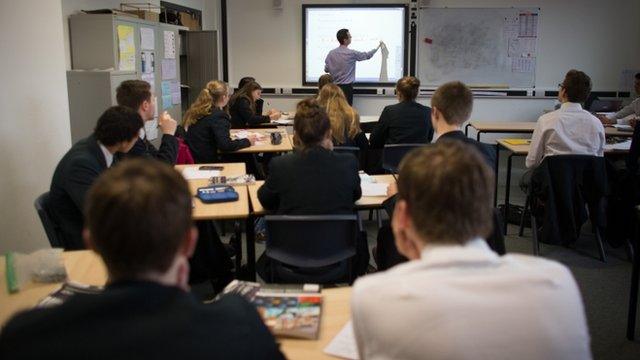Is school funding the next crisis?
- Published

Schools have been warning the prime minister that the sums for school budgets do not add up
After the NHS and social care, is the next funding crisis going to be in England's schools?
Like a snowball getting bigger as it rolls downhill, momentum is gathering around the warnings of school leaders about impending cash problems.
Head teachers have said a lack of cash might force them to cut school hours.
Ministers were forced by a Parliamentary question to reveal that more than half of academies lacked enough income to cover their expenditure.
And school governors - the embodiment of local civic worthies - have threatened to go on strike for the first time, rather than sign off such underfunded budgets.
Petitions and protest letters have been sent to MPs about cuts to jobs and school services - and warning letters from head teachers will have been sent home to alert parents.
Grammar school head teachers have gone a step further and warned that parents might to have to pay to make up the shortfall.
Deprivation funding
School leaders see themselves rather like look-outs on the Titanic shouting out that there's a great big iceberg ahead - backed by the National Audit Office's finding that schools face 8% real-term spending cuts, worth £3bn, by 2020.
The spending watchdog says costs for schools are outstripping the budgets allocated by the government.

The spending watchdog says schools will have to find £3bn in budget cuts
The missing piece in this debate has been any real sign of movement from the government - other than to keep repeating that school funding is at record levels.
But plenty will be going on behind the scenes, and there is no shortage of "insiders" with views on what's happening.
It's claimed that ministers can't sign a birthday card without getting clearance from 10 Downing Street.
So education ministers are unable to give any indication of funding changes, in part because a consultation is still taking place and more particularly because it isn't in their gift to decide.
But there are options thought to be under discussion.
The government has announced a new formula for allocating funding to schools, responding to years of complaints about regional inequalities.
But a number of Conservative MPs in rural and suburban areas have been energetically lobbying that this slicing up of the cake is still too much in favour of the inner cities.
If the formula was shifted around a little, such as putting less emphasis on deprivation, it could shift funding from London and the big cities towards the shires.
This would not have much electoral cost for the Conservatives as their support is not in these inner-city areas.
But it would be a big call in terms of political purpose to cut funding from areas of deprivation.
£384m taken back
Another approach would be to start including pupil premium money - targeted at deprived children - into the general funding equation.
This really would mark the formal detonation of the last pillars of the Cameron and coalition era, for which the pupil premium was a moral touchstone.
There are other more creative possibilities.
It was revealed that of the money earmarked for the ill-fated plan turn all schools into academies, £384m had been taken back by the Treasury.

Heads have protested to MPs at the decisions they face in making cuts
This £384m has been claimed as being enough to make sure that there are no losers in the funding formula shake-up.
If this cash could be "rediscovered" in a virtual shoebox in the Treasury, it could come back into play, getting the government off a funding hook - without actually having to find new money.
The apprenticeship levy, about to be introduced, has also been seen as a potential pot of money. The Institute for Fiscal Studies says by 2019-20 it will be raising £2.8bn from employers - but only £640m is set to be spent on apprenticeships.
The Department for Education has so far not been able to explain where the rest of this money might be heading.
Of course, another option is that the government refuses to move and schools have to operate within their budgets.
Angry head teachers
What would this mean in practice?
To take a real-life example shown to the BBC, what happens when a secondary school faces a shortfall of £350,000.
The only way to make such savings is to cut staff - heads and governing bodies will be making such tough decisions.
Which subject should they stop teaching? Which teachers should they make redundant? Should they get rid of counsellors for mental health problems? Should they merge classes? And who gets to lose out on the quality of their education?
This has left head teachers furious.
There has always been a well-developed moaning culture in education, but there is no escaping the outrage among school leaders about the lack of political response to funding worries.
They were even more livid when they found that the government had found money to expand grammar schools - and have written angry letters asking which services they should cut in their own schools.
They see ministers and MPs rather like untrustworthy children who won't take responsibility for their decisions.
There is also brinkmanship on both sides. Will schools really send home children because of a lack of cash?
And the government will worry that if they crack over schools, it would start a feeding frenzy of other demands on public spending.
A Department for Education spokesman said that school funding is already at its highest level - more than £40bn for 2016-17.
And the department says that it has grasped the nettle of introducing a long overdue national funding formula.
"Significant protections have also been built into the formula so that no school will face a reduction of more than more than 1.5% per pupil per year or 3% per pupil overall.
"But we recognise that schools are facing cost pressures, which is why we will continue to provide support to help them use their funding in cost effective ways, including improving the way they buy goods and services, so they get the best possible value."
- Published27 January 2017
